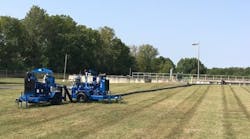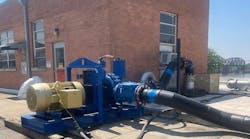| Related Searches from WaterInfoLink.com Severn Trent Services | Public-Private Partnership | Chlorine Analyzer | Nitrate Removal |
How do water and wastewater treatment facilities address discharge limits that are consistently exceeded? In the case of Penn Township. Pa., they enter into a public-private partnership. The result: no further excursions.
Located west of Philadelphia in Lancaster County, Penn Township resides in a region best known for its large Amish population and farm-laden landscapes. Despite the idyllic existence, the area has also experienced challenging times. In 2007, for example, the Township’s wastewater treatment plant was consistently exceeding discharge limits of several contaminants, including ammonia-nitrogen, total suspended solids, total phosphorous and carbonaceous biochemical oxygen demand.
In 2008, the Township board began looking for an alternative means of managing the water system, which serves 2,200 customers, and the wastewater system, which serves approximately 4,200 customers. The wastewater system consists of a 0.650-million-gal-per-day sequencing batch reactor (SBR) plant utilizing ultraviolet disinfection, aerobic digestion and dewatering. The plant had been upgraded with dissolved oxygen control for biological nutrient removal in 2005. The system includes seven wastewater pump stations and the collection system. The Township’s water system consists of one 225-gal per minute submersible well pump utilizing sodium hypochlorite disinfection and polyphosphate to sequester manganese. It also comprises one well, the distribution system, fire hydrants and an elevated storage tank.
The board began investigating the viability of entering into a public-private partnership through contract operations. Penn Township also was aware of several local successful public-private partnerships. For example, Severn Trent Services operated facilities in four municipalities within 50 miles of the Penn Township plant: Lititz, Bernville, Boyertown and Downingtown.
In May 2008, the Township received bids from two vendors for the operation and maintenance of the Township’s water and wastewater facilities. In June, Penn Township awarded a contract to Severn Trent Services . The contract included full staffing for the water and wastewater facilities’ operations. The company promoted an assistant manager from its Lititz project to plant manager in Penn Township, brought in a maintenance technician from the Bernville project and hired a new plant operator. Beginning work that summer, the company immediately evaluated the treatment process, developed and is now implementing a plan to improve operations and ensure permit compliance.
Operation of the wastewater system includes responsibility for the treatment facility and the pump stations and maintaining the distribution system. A new water treatment facility is currently being designed, which will feature microfiltration and nitrate removal . Penn Township also is moving forward with plans to complete an interconnection with a neighboring water system, which will require a booster station. Severn Trent also reads and maintains system water meters and provides maintenance for system valves.
Most of Penn Township’s systems violations prior to initiation of the public-private partnership were related to solids in the wastewater effluent. Severn Trent maintained a lower mixed liquor suspended solids concentration than had been allowed by previous operators—a change that had first been implemented by an interim consultant. Company personnel also developed substantial process monitoring procedures and began tracking and evaluating data in order to consistently maintain compliance.
Another of Severn Trent’s most pressing challenges was to stabilize the disinfection residual in the water system. Previous operators were maintaining minimal chlorine residual at the entry point. Severn Trent put a chlorine analyzer online that will signal an alarm if the chlorine residual drops below an operator-inputted setpoint. The company also connected the chlorine analyzer to a relay that will shut down the well pump if the residual drops below the setpoint, preventing water that has not been properly disinfected from entering the water system.
In the year and a half since the inception of the partnership, the wastewater plant has experienced no discharge permit excursions. Neither have there been any controllable water quality excursions. The Township has experienced other benefits of its public-private partnership, including improved communications between plants operators and the Township and the Authority. Severn Trent also has repaired or replaced a number of water meters that had been malfunctioning and had become a drain on the Township’s water revenue.
David Kratzer, Penn Township manager, who previously had served as assistant manager of nearby Warwick Township, pointed to other benefits of the Township’s public-private partnership. “First and most significantly, Severn Trent has brought a level of technical proficiency to the operation and maintenance of our facilities. They have taken the technology we have and utilized it most efficiently and effectively. Their existing relationships with regulatory authorities and reputation for professionalism were key to re-attaining our plant’s operational compliance.
“Lastly, I’ve been impressed with Severn Trent personnel’s community involvement. In Warwick Township, whose wastewater system also was operated by Severn Trent, the plant manager was very active in the local watershed alliance. Here in Penn Township, the company’s staff is always willing to go above and beyond, whether it’s giving plant tours or getting involved in community events. Our partnership has been extremely positive in a variety of ways.”


